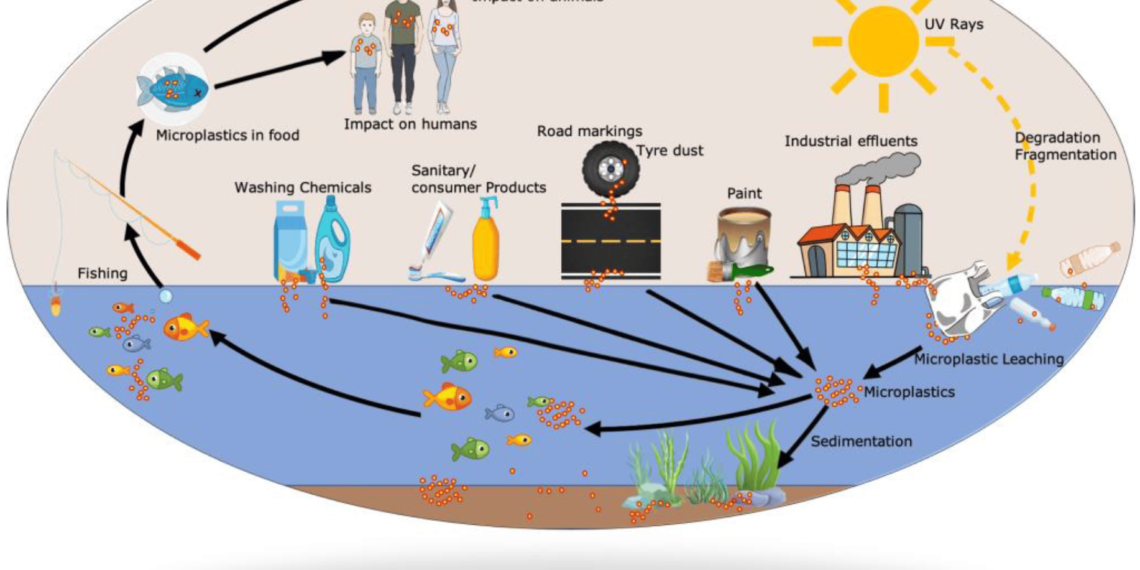A new survey carried out at Leiden University, have raised the alarm that the world is being clogged with plastic, maintaining that tiny particles of plastic that cannot be seen with the naked eye have been found almost everywhere from the oceans’ depths to the mountain tops.
The study, which was published by Michael Richardson and Meiru Wang in The Conversation Africa on Wednesday, June 19, 2024, disclosed that microplastics and nanoplastics are found in the soil, plants, animals and human body and asked what harm, if any, are they likely causing to human beings, the soil, plants, animals and nature generally?
“When plastic trash is dumped in a landfill or the sea, it breaks down, very slowly. Sunlight and waves cause the surface of the plastic to become brittle, and particles are shed into the environment.
Collectively known as “small plastic particles”, they range in size from five millimetres or smaller (microplastics) to less than one-thousandth of a millimetre (nanoplastics). The smallest can only be detected with special scientific instruments.
“It remains unclear how microplastics and nanoplastics get inside living things, but several entry points have been suggested. For example, they might pass through the gut from food or drink contaminated with small plastic particles. Or they may be breathed in, or absorbed through the skin.
“Our research suggests that, for some animals at least, nanoplastics are bad news. We injected plastic nanoparticles into chicken embryos. We found that the particles travelled quickly in the blood to all tissues, especially the heart, liver and kidneys. They were also excreted by the embryonic kidneys,” the reports stated.
It further noted: “We noticed, too, that plastic nanoparticles tend to stick to a certain type of stem cell in the embryo. These cells are essential for the normal development of the nervous system and other structures. Any damage to stem cells could put the development of the embryo in jeopardy.
“We suspect that the chicken embryo stem cells have substances on their surface, called “cell-adhesion molecules”, which stick to the polystyrene nanoparticles that we used. We are following up this finding, because when nanoplastics stick to cells and get inside them, they can cause cell death and even serious birth defects in chickens and mice.”
The report also pointed out that similar studies cannot, of course, be carried out on people, so it is not yet possible to say what the implications of our animal research are for humans, adding: “What we do know is that nanoplastics are found in the blood of human beings, in other bodily fluids and several major organs and key body tissues.
“In recent years, microplastics and nanoplastics have been found in the brains, hearts and lungs of humans. They have been discovered in the arteries of people with arterial disease, suggesting they may be a potential risk factor for cardiovascular disease. And they have been detected in breast milk, the placenta and most recently, penises.
“Nanoplastics have even been found in breast milk. Dzmitry Kliapitski and Alamy Stock Photo Chinese researchers reported earlier this year that they had found microplastics in human and dog testes. More recently, another Chinese team found microplastics in all 40 samples of human semen they tested. This follows an Italian study that found microplastics in six of 10 samples of human semen.
“Our fear is that microplastics and nanoplastics might act in a similar way to deadly asbestos fibres. Like asbestos, they are not broken down in the body and can be taken up into cells, killing them and then being released to damage yet more cells.”
The researchers said the process is reassuring, for now, but there is there a need for caution here, adding that there is yet no evidence that nanoplastics can cross the placenta and get into the human embryo.
Read also: Nigeria Customs Service restates commitment to stable, prosperous, mutually beneficial economy
“Also, even if nanoplastics do cross the placenta and in sufficient numbers to damage the embryo, we would expect to have seen an increase in abnormal pregnancies in recent years because the problem of plastic waste in the environment has been growing enormously over the years. But we are not aware of any evidence of a corresponding, large increase in birth defects or miscarriages.
“That, for now, is reassuring. It may be that microplastics and nanoplastics, if they do cause harm to our bodies, do so in a subtle way that we have not yet detected. Whatever the case, scientists are working hard to discover what the risks might be.
“One promising avenue of research would involve the use of human placental tissue grown in the laboratory. Special artificial placenta tissues, called “trophoblast organoids,” have been developed for studying how harmful substances cross the placenta,” the report added.
Researchers are also investigating potentially beneficial uses for nanoplastics. Although they are not yet licensed for clinical use, the idea is that they could be used to deliver drugs to specific body tissues that need them. Cancer cells could, in this way, be targeted for destruction without damaging other healthy tissue.
“Whatever the outcome of nanoplastics research, we and many other scientists will continue trying to find out what nanoplastics are doing to the environment,” they concluded.






